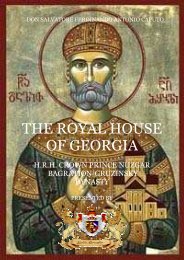here - Nobility Associations
here - Nobility Associations
here - Nobility Associations
Create successful ePaper yourself
Turn your PDF publications into a flip-book with our unique Google optimized e-Paper software.
Yet even his enemies admitted his extraordinary ability. The Franciscan, Fra<br />
Salimbene, wrote that if he had been a true Catholic, and had loved God and the<br />
Church, few Emperors would have been his equals. His followers seem to have<br />
looked on him as a kind of Messiah, a mystic incarnation of divine power. They<br />
compared him to Christ, and punned on the name of his minister, Peter de la<br />
Vigne, the "corner-stone," the "fruitful vine," the Peter who would not betray his<br />
Master. He himself spoke of his mother as “holy," and called his birth-place<br />
“Bethlehem," and he was hailed as “Sanctus Fridericus." How far these claims were<br />
serious, how far they represent mere extravagant adulation is doubtful. Frederick<br />
posed deliberately as the successor of the ancient Eoman Emperors, the heir of all<br />
their rights and dignities, but he always professed his loyalty to the Church which<br />
had excommunicated him, though he advocated ecclesiastical reforms, and, in<br />
particular, a return to apostolic poverty.<br />
“The primitive Church," he said,” was based on poverty and simplicity." If his<br />
tolerance of Jews and Mohammedans, his rationalism and love of scientific study<br />
were enough to condemn him in the eyes of the orthodox, the visionary poetic<br />
strain in his character, and his daring intellectual originality fascinated the<br />
imagination of the dreamer and the fanatic. Men were loath to believe that he was<br />
really dead. The prophecies of the Abbot The Joachim were applied to him, and it<br />
was Frederick believed that he would come again, whether for evil or for good, as<br />
Antichrist, or as the defender of the Church and the savior of Germany. He was<br />
more than once personated by impostors, and, in the fifteenth century, legend told<br />
how he waited, hidden in a Thuringian mountain, for the day of the deliverance of<br />
Germany.<br />
Henry VII Hohenstaufen *1211 - †1242<br />
The Rebellious King<br />
1211- †12.II.1242<br />
King of Sicily II.1212<br />
Duke of Swabia 1216/'17<br />
Rector of Burgundy 4.I.1220<br />
King of Rome 1220 - 1235<br />
Elected Frankfurt 23.IV.1220<br />
Crowned Aachen 8.V.1222<br />
Deposed 2/4.VII.1235<br />
Henry VII (*1211- †12.II.1242) was the first son of<br />
Frederick II of Hohenstaufen and Constance of<br />
Aragon. He was crowned a king of Sicily when he<br />
was still a baby and became a duke of Swabia when he was five. His dazzling career<br />
The Hohenstaufen Dynasty - Page 54 of 200



